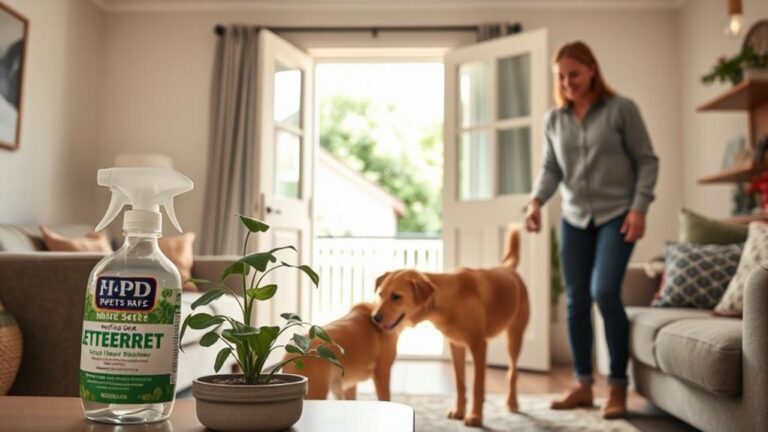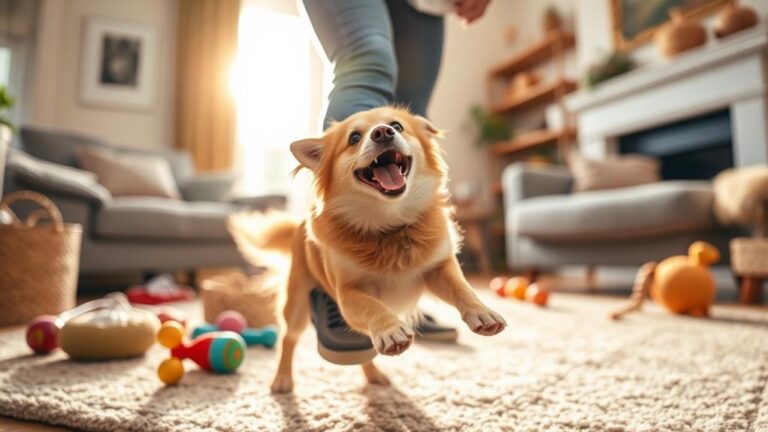To deter your dog from peeing in the house, try using scents they dislike. Citrus, vinegar, and hot peppers can work well as repellents. You can also create a homemade spray with vinegar and citrus oil. Besides using scents, consistent training is essential. Make sure to give your dog regular potty breaks and reward them for doing their business outside. It's also a good idea to monitor for any signs of anxiety or health issues. With some simple changes and techniques, you can make a big difference. There's more helpful information to explore that can help you succeed!
Scents That Deter Dogs
Certain scents can effectively deter dogs from peeing indoors. Citrus is one of the best options. Dogs usually dislike the smell, making it a strong repellent.
Additionally, keeping your dog safe from harmful substances is vital, as some food items like onions pose risks due to their toxicity to dogs onion toxicity and risks.
Vinegar is another effective choice. Its acetic acid scent can keep dogs away from certain areas.
Hot peppers also work well, as their strong aroma can discourage your dog from urinating.
Essential oils mixed with vinegar create an aromatic barrier that dogs tend to avoid.
Ammonia is unpleasant for dogs too, helping prevent indoor accidents.
Try using these scents in spots where your dog tends to mark. With consistent application, you can create a less inviting environment for your pet, keeping your home cleaner.
Effective Solutions for Indoor Peeing
To tackle indoor peeing effectively, it's important to address the root causes. Start by visiting the vet to rule out any medical issues, as conditions like kidney disease or urinary tract infections can lead to accidents indoors.
If your dog is healthy, consider spaying or neutering. This can help reduce territorial marking. Consistent training is key. Reinforce proper potty habits with positive rewards.
Additionally, be aware of signs of anxiety or discomfort, as they can also contribute to indoor peeing recognizing signs of pain.
Make sure you give your dog frequent outdoor breaks. Regular bathroom trips can minimize accidents indoors.
If these steps don't work, seek professional help. Dog trainers or behaviorists can offer tailored advice to fix persistent issues.
Benefits of Using Vinegar
Using vinegar as a cleaning solution offers multiple benefits for dog owners dealing with indoor accidents. First, dogs dislike the smell of vinegar, making it a natural deterrent. When you clean up an accident with vinegar, it helps prevent your dog from returning to that spot.
Additionally, frequent urination may indicate underlying health issues, and ensuring your dog is healthy is essential. Vinegar acts as an odor neutralizer, breaking down the lingering smells of urine, helping your home smell fresh again.
Monitoring habits helps identify sudden changes indicating health issues. Moreover, it's a non-toxic option, safe for both pets and kids.
To use it, simply mix equal parts vinegar and water and spray it on the affected area. This easy solution not only cleans but also helps keep your dog from peeing indoors again.
Cayenne Pepper as a Deterrent
While vinegar is a great natural deterrent for indoor accidents, cayenne pepper can also be an effective solution. This strong spice has a scent that dogs dislike, making it a useful repellent. You can easily use it to keep your dog from peeing in unwanted areas.
- Mix cayenne pepper with mustard powder and flour for a potent outdoor deterrent.
- Sprinkle it around spots where your dog tends to have accidents.
- It's a natural solution that's safe for your pets and the environment.
Creating Homemade Repellent Sprays
Creating a pee-free home can be achieved with homemade repellent sprays. These sprays are easy to make and effective. A simple recipe includes 1.5 cups of water, 2 tablespoons of vinegar, and 20 drops of citrus oil.
Mix these ingredients in a spray bottle. The citrus scent repels dogs, as they generally dislike it. You can spray this mixture on floors and carpets where your dog tends to mark. Regular application helps maintain a pee-free environment.
Plus, it's non-toxic, making it safe for pets and children. Just remember to test it on a small area first to avoid any damage. With these homemade sprays, you'll have a better chance of keeping your home clean and odor-free.
Training Techniques for Dogs
Training your dog effectively can greatly reduce indoor accidents. Consistent training sets clear expectations for your pet.
Here are some techniques that can help:
- Positive Reinforcement: Reward your dog with treats or praise when they go outside. This encourages them to repeat the behavior.
- Regular Potty Breaks: Take your dog out frequently, especially after meals and naps. This helps them learn when it's time to go.
- Watch for Signs: Pay attention to your dog's body language. If they circle or sniff, it's time to head outside.
With patience and consistency, you'll help your dog understand where it's appropriate to relieve themselves.
This will lead to fewer accidents in your home and a happier pet!
Conclusion
Ultimately, keeping your home pee-free is possible with the right strategies. Use scents like citrus or vinegar to deter your dog from peeing indoors. You can also try cayenne pepper or homemade repellent sprays. Don't forget to train your dog and give them regular bathroom breaks. If accidents keep happening, it might be time to seek professional help. With a little effort, you can create a happier, cleaner space for both you and your furry friend.



